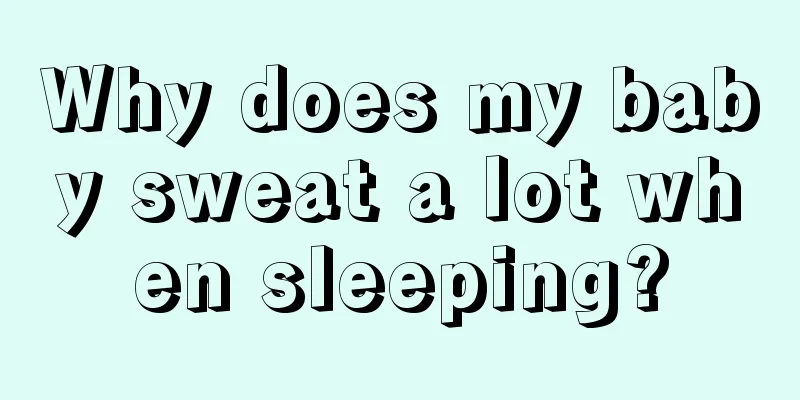What’s a good way to treat children’s recurring high fever?

|
Many parents are very worried about their children's fever, especially when their children have repeated fevers. What should they do? Many mothers are very anxious, so today the editor will share some knowledge with you in detail, let’s take a look! Fever is divided into three stages, and you do not have to take antipyretics or suppositories as soon as you have a fever. Pay attention to keeping warm during the chill period. If the child's fever exceeds 38.5℃, antipyretics or suppositories can be used, and the dosage must be noted. During the fever, the child should drink plenty of water, wear loose clothing, and use physical methods to dissipate heat, such as warm water baths, using ice pillows or water pillows to cool down. During the fever-reducing period, children should drink plenty of water or supplement with electrolytes specifically for children to avoid dehydration caused by excessive water loss. When using antipyretics for children with fever, you must pay attention to the dosage. If overdose, the patient will experience symptoms such as fatigue, nausea, vomiting or jaundice, which may lead to acute liver poisoning or liver failure. Suppositories should not be used for children who are prone to diarrhea to avoid irritation to the rectum or anus. The correct way to deal with a child's fever is to provide home care in three stages. Generally, the discomfort symptoms can be relieved and the fever can be completely subsided within three days. If parents find that their children have recurring fevers or high fevers that last for more than three days, and have poor activity such as fatigue, weakness in the limbs, drowsiness, etc., they should seek medical attention as soon as possible. First understand the dosage of antipyretics If you buy antipyretic drugs on your own, it is best to consult a pharmacist or family doctor first. Antipyretics with ingredients such as Acetaminophen and Ibuprofen must be calculated based on the child's weight. The upper limit of medication for children under 6 years old is 90 mg per kilogram per day. For example, a child weighing 10 kg can only take a maximum of 900 mg per day. Overdose may cause acute liver poisoning or liver failure. Do not use suppositories if you are prone to diarrhea Many parents use suppositories in addition to antipyretics when their children have a high fever. Suppositories are more effective than antipyretic drugs and are generally recommended if the body temperature exceeds 39°C. However, since suppositories can easily irritate children's rectum or anus, children who are prone to diarrhea or gastrointestinal discomfort should avoid using them. Chill period Symptoms: shivering, fear of cold, cold hands and feet, chills, etc. Keep warm Generally, the body temperature will rise rapidly within about 10 to 30 minutes during the shivering period. If parents find that their children are afraid of cold or shivering, they should pay attention to keeping them warm. They can let their children wear more clothes or add blankets to keep the body and hands and feet warm, and at the same time, they should drink more warm water. It is not recommended to sleep with an ice pillow, water pillow, or take a warm bath immediately at this time, otherwise it will aggravate the symptoms. Wear loose cotton clothing Whether the body is feverish or the heat dissipation is poor, the body temperature will rise. When the body temperature is 38.5℃, you can let your child wear loose, breathable clothing with a high cotton content to facilitate heat dissipation. In addition, the room should be well ventilated and the room temperature should be kept between 24 and 26 degrees Celsius. Warm water bath to help dissipate heat During the fever period, parents can wipe the child's body with warm water. The water temperature should be between 38 and 40 degrees Celsius to dilate the skin's capillaries and achieve sweating and heat dissipation through water vapor. Taking a warm bath can also dilate the blood vessels in the child's skin, achieving the effect of heat dissipation. Sleeping with an ice pillow helps cool down Taking antipyretics is the most direct and effective way to dissipate heat. In addition to antipyretics, physical cooling methods such as warm water baths can be used to assist, or children can sleep with ice pillows or water pillows to cool down, or fever-reducing patches can be applied to the forehead, armpits, neck, etc., all of which help dissipate heat from the body. Fever Symptoms: Body temperature drops, blood vessels dilate, children sweat, and physical strength and mobility gradually recover. Electrolyte supplement for children After the fever subsides, because children sweat, parents should help their children change clothes frequently to keep their bodies dry. They can also let their children drink plenty of water to help continue to cool down, or supplement children with special electrolytes to replenish the large amount of lost body water and electrolytes to avoid dehydration due to water loss. Continue to observe for 48 to 72 hours A body temperature over 38.5℃ is a fever, which is the immune system's response to bacteria or viruses invading and fighting inflammation. A moderate fever can strengthen the body's immune system. As long as the fever is not persistent and the child's activity is not affected, it only needs to be observed for about 48 to 72 hours, and parents do not need to be overly nervous. Through the editor’s sharing above, you have a certain understanding of how to deal with children’s repeated fevers. If you encounter this situation in your future life, you might as well try the method shared by the editor! |
<<: What does it mean when a toddler grinds his teeth while sleeping at night?
>>: What are some ways to quickly reduce fever in children?
Recommend
How tall is a normal baby at three months old
Recently, wherever mothers gather, you can hear t...
What should I do if my child always loses his temper?
If a child always loses his temper, parents shoul...
The dangers of smoking among teenagers
Many teenagers nowadays mature early, and some of...
10-year-old child can't sleep at night
Most children can sleep longer than adults. Usual...
What should I do if my child has a cold and fever repeatedly?
Some children have caught a cold and had a fever....
What is the cause of the small bumps on the back of children’s hands?
Children's bodies are more prone to problems ...
What to do if your child is allergic to eggs
Eggs are highly nutritious and most people like t...
What is the order of teeth growth in children?
When children are teething, there are many issues...
What are the causes of infant nodding spasms?
In clinical practice, infant nodding spasms are a...
Can babies eat yogurt when they are 1 year old?
As we all know, the lactobacilli in yogurt are ac...
What kind of daily care is needed for babies suffering from eczema?
Nowadays, many babies suffer from skin diseases s...
Baby's esotropia
Nowadays, many children may develop myopia becaus...
What are the benefits of children's protein powder
It is the wish of all parents that their children...
What should we do if children have dental polyps?
Many children do not pay attention to their daily...
Scar repair method for children's face
Scars on children's faces not only affect the...









